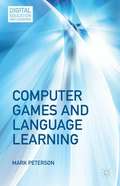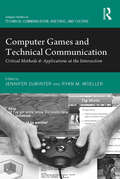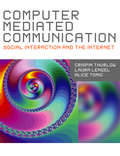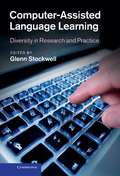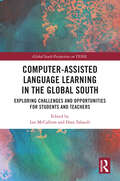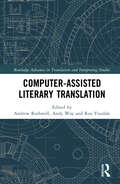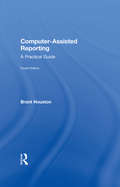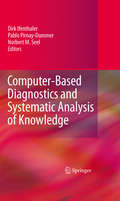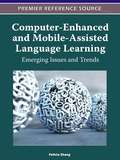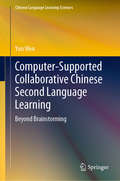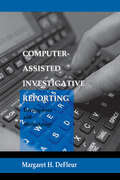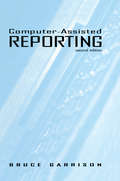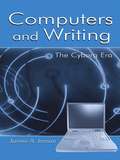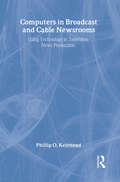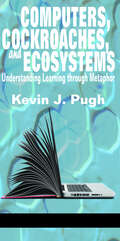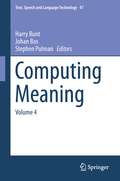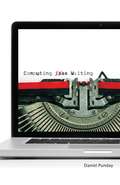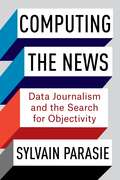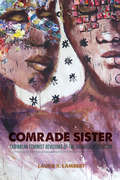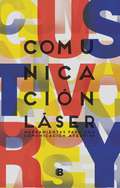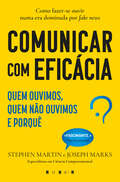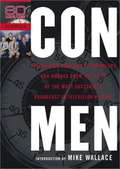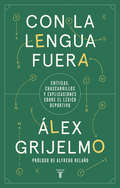- Table View
- List View
Computer Games And Language Learning
by Mark PetersonA comprehensive and accessible overview for language educators, researchers, and students, this book examines the relationship between technological innovation and development in the field of computer-assisted language learning, exploring relevant theories and providing practical evidence about the use of computer games in language learning.
Computer Games and Technical Communication: Critical Methods and Applications at the Intersection (Routledge Studies in Technical Communication, Rhetoric, and Culture)
by Jennifer deWinter Ryan M. MoellerTaking as its point of departure the fundamental observation that games are both technical and symbolic, this collection investigates the multiple intersections between the study of computer games and the discipline of technical and professional writing. Divided into five parts, Computer Games and Technical Communication engages with questions related to workplace communities and gamic simulations; industry documentation; manuals, gameplay, and ethics; training, testing, and number crunching; and the work of games and gamifying work. In that computer games rely on a complex combination of written, verbal, visual, algorithmic, audio, and kinesthetic means to convey information, technical and professional writing scholars are uniquely poised to investigate the intersection between the technical and symbolic aspects of the computer game complex. The contributors to this volume bring to bear the analytic tools of the field to interpret the roles of communication, production, and consumption in this increasingly ubiquitous technical and symbolic medium.
Computer Mediated Communication
by Crispin Thurlow Alice Tomic Lara LengelThis book offers students a task-based introduction to Computer-Mediated Communication and the impact of the internet on social interaction. Divided into four parts which require students to learn, (theory), critique, (current issues), explore, (methods), and reflect, (practice), the book aims to: Provide a foundation to the social and communicative nature of information and communication technologies Enable students to engage with the key theoretical issues associated with CMC Equip students with the necessary research and technical skills as a stimulus to independent enquiry. In spite of the rapidly increasing interest in Internet Studies and CMC and the introduction of many university courses in the area, no specialised, introductory textbook exists. This coursebook responds to the need for such a text. Aimed primarily at communication students, this book would also be useful as a sourcebook for students of media, sociology, psychology and English Language Studies. Companion website resources can be found at http://crispinthurlow.net/cmc/
Computer-Assisted Language Learning
by Glenn StockwellComputer-assisted language learning (CALL) is an approach to teaching and learning languages that uses computers and other technologies to present, reinforce, and assess material to be learned, or to create environments where teachers and learners can interact with one another and the outside world. This book provides a much-needed overview of the diverse approaches to research and practice in CALL. It differs from previous works in that it not only surveys the field, but also makes connections to actual practice and demonstrates the potential advantages and limitations of the diverse options available. These options are based squarely on existing research in the field, enabling readers to make informed decisions regarding their own research in CALL. This essential text helps readers to understand and embrace the diversity in the field, and helps to guide them in both research and practice.
Computer-Assisted Language Learning in the Global South: Exploring Challenges and Opportunities for Students and Teachers (Global South Perspectives on TESOL)
by Lee McCallum and Dara TafazoliThis cross-cultural edited volume presents a rich tapestry of experiences, challenges, and innovations, focusing on assessment, course and curriculum design, approaches to pedagogy and teacher professional development in computer-assisted language learning (CALL) in the Global South.Comprising chapters from a broad swathe of international contexts, the book presents varied themes in CALL such as inclusion and social justice, artificial intelligence, barriers to online language teaching, skills-based practices, and professional development. By shedding light on the underrepresented research contexts in the Global South, a number of current innovations in these contexts at theoretical and empirical levels are showcased, resulting in a highly novel and cutting-edge volume that gives voice to perspectives on the implementation of CALL in less-privileged countries.Providing comparative research and innovative ways in which CALL can be harnessed in less-privileged contexts despite lack of resources in some cases, this book will appeal to scholars, researchers, and postgraduate students in the fields of technology in education, language and linguistics, as well as open and distance education and eLearning. CALL and TESOL educators may also benefit from the book.
Computer-Assisted Literary Translation (Routledge Advances in Translation and Interpreting Studies)
by Andrew Rothwell, Andy Way and Roy YoudaleThis collection surveys the state of the art of computer-assisted literary translation (CALT), making the case for its potential to enhance literary translation research and practice. The volume brings together early career and established scholars from around the world in countering prevailing notions around the challenges of effectively implementing contemporary CALT applications in literary translation practice which has traditionally followed the model of a single translator focused on a single work. The book begins by addressing key questions on the definition of literary translation, examining its sociological dimensions and individual translator perspective. Chapters explore the affordances of technological advancements and availability of new tools in such areas as post-edited machine translation (PEMT) in expanding the boundaries of what we think of when we think of literary translation, looking to examples from developments in co-translation, collaborative translation, crowd-sourced translation and fan translation. As the first book of its kind dedicated to the contribution CALT in its various forms can add to existing and future scholarship, this volume will be of interest to students and scholars in Translation Studies, especially those working in literary translation, machine translation and translation technologies.
Computer-Assisted Reporting: A Practical Guide (4th Edition)
by Brant HoustonThis straightforward and effective how-to guide provides the basics for any journalist or student beginning to use data for news stories. It has step-by-step instructions on how to do basic data analysis in journalism while addressing why these digital tools should be an integral part of reporting in the 21st century. The book pays particular attention to the need for accuracy in computer-assisted reporting and to both the potential and pitfalls in utilizing large datasets in journalism. An ideal core text for courses on data-driven journalism or computer-assisted reporting, Houston pushes back on current trends by helping current and future journalists become more accountable for the accuracy and relevance of the data they acquire and share. Online instructor's materials are available to adopting professors, and additional exercises are available free online to students at the below address: http://ire.org/carbook/username: carbookpassword: carbook4
Computer-Based Diagnostics and Systematic Analysis of Knowledge
by Norbert M. Seel Dirk Ifenthaler Pablo Pirnay-DummerWhat is knowledge? How can it be successfully assessed? How can we best use the results? As questions such as these continue to be discussed and the learning sciences continue to deal with expanding amounts of data, the challenge of applying theory to diagnostic methods takes on more complexity. Computer-Based Diagnostics and Systematic Analysis of Knowledge meets this challenge head-on as an international panel of experts reviews current and emerging assessment methodologies in the psychological and educational arenas. Emphasizing utility, effectiveness, and ease of interpretation, contributors critically discuss practical innovations and intriguing possibilities (including mental representations, automated knowledge visualization, modeling, and computer-based feedback) across fields ranging from mathematics education to medicine. These contents themselves model the steps of systematic inquiry, from theoretical construct to real-world application: Historical and theoretical foundations for the investigation of knowledge Current opportunities for understanding knowledge empirically Strategies for the aggregation and classification of knowledge Tools and methods for comparison and empirical testing Data interfaces between knowledge assessment tools Guidance in applying research results to particular fields Researchers and professionals in education psychology, instructional technology, computer science, and linguistics will find Computer-Based Diagnostics and Systematic Analysis of Knowledge a stimulating guide to a complex present and a rapidly evolving future.
Computer-Enhanced and Mobile-Assisted Language Learning: Emerging Issues and Trends
by Felicia ZhangAs the field of Information and Communication Technologies rapidly expands, the applications to language learning continue to grow. Computer-Enhanced and Mobile-Assisted Language Learning: Emerging Issues and Trends compiles the latest research into computer-enhanced language learning, as well as the integration of mobile devices into new language acquisition. Though new information is constantly coming out as technologies continue to evolve, this important new follow-up publication will be distributed worldwide among academic and professional institutions and will be instrumental in providing researchers, scholars, students, and professionals access to the latest knowledge related to research on computer-enhanced and mobile assisted language learning.
Computer-Supported Collaborative Chinese Second Language Learning: Beyond Brainstorming (Chinese Language Learning Sciences)
by Yun WenThis book explores the implementation of an online representational tool, GroupScribbles, in Chinese-as-a-second-language classrooms from primary school to secondary school. It demonstrates the effectiveness of combining online representational tools with face-to-face classroom learning, and provides a workable approach to analysing interactions interweaving social and cognitive dimensions, which take place in the networked classroom. A series of suggestions regarding networked second language learning will help educators effectively implement information and communication technology tools in the classroom.
Computer-assisted Investigative Reporting: Development and Methodology (Routledge Communication Series)
by Margaret H. DeFleurConducting computer analyses for the purposes of revealing information of significance to the press represents an extension of one of the most important forms of American journalism into the contemporary era of new technologies. Investigative reporting had its start with the establishment of the metropolitan newspaper during the early decades of the 1900s. At the time, it was a continuation of the evolving tradition of freedom of the press that had characterized American political life since colonial times. As it developed, investigative reporting stressed facts rather than the opinions of the editor or reporter. In turn, that tradition had its own intellectual roots. Today, computer-assisted investigative reporting (CAIR) extends that "marketplace of ideas" into systematic examinations of the electronic records of government. In addition, computer analyses of other kinds of information systematically gathered by journalists can provide the press with insights into trends and patterns unlikely to be revealed by other means. This unique volume addresses procedures and issues in investigative journalism that have not been explained in other publications. It sets forth -- for the first time -- a detailed and specific methodology for conducting computer-assisted investigative analyses of both large and small scale electronic records of government and other agencies. That methodology consists of the logic of inquiry, strategies for reaching valid conclusions, and rules for reporting what has been revealed by the analyses to the public in clear ways. Such systematic methodologies are essential in social and other sciences and the development of a counterpart for investigative journalism has been badly needed. That systematic methodology is developed within a context that explains the origin and major characteristics of those elements that have come together in American society to make computer-assisted investigative reporting both possible and increasingly a part of standard newsroom practices. These include the development of traditional investigative journalism, the evolution of computer technology, the use of computers by government to keep records, the legal evolution of freedom of information laws, the rapid adoption of computers in newsrooms, the increasing importance of precision journalism, and the sharp increase in recent times of computer-assisted investigative reporting by American newspapers both large and small. The issues addressed in this book are discussed in a very readable context with an abundance of examples and illustrations drawn from the real world of journalism as it is practiced daily in newsrooms around the country. Explanations of concepts, principles, and procedures are set forth in layperson's terms that require very little in the way of knowledge of computers or statistical methods.
Computer-assisted Reporting (Routledge Communication Ser.)
by Bruce GarrisonReporters in the newsroom are becoming more involved in computer-assisted reporting and online news research than ever before. This edition introduces readers to computer-assisted reporting and to describe how leading journalists are using personal computers for news gathering in modern print, broadcast, and online newsrooms. It provides a thorough discussion of technology and its applications to news reporting. Computer Assisted Reporting focuses on the computerization of newsgathering, highlighting the fact that the computer assists journalists by making writing easier, and also makes gathering and organizing information more efficient. As it begins, the book demonstrates methods for journalists to get more from their computers, such as data retrieval, data analysis, information storage, and dissemination of that information in both processed and unprocessed forms. It concludes with a refined proposal, originally proposed in the first edition, for five stages for development of computer literacy in the newsroom.
Computers and Writing: The Cyborg Era
by James A. InmanIn this book, James A. Inman explores the landscape of the contemporary computers and writing community. Its six chapters engage critical issues, including redefining the community's generally accepted history, connecting its contemporary innovators with its long-standing spirit of innovation, advocating for increased access and diversity, and more. Between chapters, readers will find "Community Voices" sections, which provide a snapshot of the contemporary computers and writing community and introduce, in a non-hierarchical form, more than 100 of its members from around the world, in their own voices. Computers and Writing: The Cyborg Era features a simultaneous emphasis on individuals, communities, and contexts they share; a creative rethinking of the character and values of the computers and writing community; a holistic exploration of meaning-making; and an activist approach to pedagogy. It is a must-read book for anyone interested in rhetoric, technology, and pedagogy, including faculty, graduate students, and colleagues in professions outside the academy.
Computers in Broadcast and Cable Newsrooms: Using Technology in Television News Production (Routledge Communication Series)
by Phillip O. KeirsteadComputers in Broadcast and Cable Newsrooms: Using Technology in Television News Production takes readers through the use of computers and software in the broadcast/cable newsroom environment. Author Phillip O. Keirstead began writing about television news technology decades ago in an effort to help television news managers cope with technological change. In this text, he demonstrates the myriad ways in which today's journalism is tied to technology, and he shows how television news journalists rely on varied and complex technologies to produce timely, interesting, and informative broadcasts. Using a hands-on, practical approach to cover the role computers play in various parts of the newsroom, the volume will be of great practical value to undergraduate and graduate students in advanced broadcast/news television courses.
Computers, Cockroaches, And Ecosystems: Understanding Learning Through Metaphor
by Kevin J. PughOf all the topics ever studied, surely one of the most compelling is human learning itself. What is the nature of the human mind? How do we understand and process new information? Where do new ideas come from? How is our very intelligence a product of society and culture? <p><p> Computers, Cockroaches, and Ecosystems: Understanding Learning through Metaphor brings to light the great discoveries about human learning by illuminating key metaphors underlying the major learning perspectives. Such metaphors include, among others, the mind as computer, the mind as ecosystem, and the mind as cultural tools. These metaphors reveal the essence of different learning perspectives in a way that is accessible and engaging for teachers and students. <p> Each metaphor is brought to life through stories ranging from the humorous to the profound. The book conveys scholarly ideas in a personal manner and will be a delight for teachers, university students, parents, business or military trainers, or anyone with an interest in learning.
Computing Meaning: Volume 4 (Text, Speech and Language Technology #47)
by Harry Bunt Johan Bos Stephen PulmanThis book is a collection of papers by leading researchers in computational semantics. It presents a state-of-the-art overview of recent and current research in computational semantics, including descriptions of new methods for constructing and improving resources for semantic computation, such as WordNet, VerbNet, and semantically annotated corpora. It also presents new statistical methods in semantic computation, such as the application of distributional semantics in the compositional calculation of sentence meanings. Computing the meaning of sentences, texts, and spoken or texted dialogue is the ultimate challenge in natural language processing, and the key to a wide range of exciting applications. The breadth and depth of coverage of this book makes it suitable as a reference and overview of the state of the field for researchers in Computational Linguistics, Semantics, Computer Science, Cognitive Science, and Artificial Intelligence.
Computing as Writing
by Daniel PundayThis book examines the common metaphor that equates computing and writing, tracing it from the naming of devices (&“notebook&” computers) through the design of user interfaces (the &“desktop&”) to how we describe the work of programmers (&“writing&” code). Computing as Writing ponders both the implications and contradictions of the metaphor.During the past decade, analysis of digital media honed its focus on particular hardware and software platforms. Daniel Punday argues that scholars should, instead, embrace both the power and the fuzziness of the writing metaphor as it relates to computing—which isn&’t simply a set of techniques or a collection of technologies but also an idea that resonates throughout contemporary culture. He addresses a wide array of subjects, including film representations of computing (Desk Set, The Social Network), Neal Stephenson&’s famous open source manifesto, J. K. Rowling&’s legal battle with a fan site, the sorting of digital libraries, subscription services like Netflix, and the Apple versus Google debate over openness in computing.Punday shows how contemporary authors are caught between traditional notions of writerly authority and computing&’s emphasis on doing things with writing. What does it mean to be a writer today? Is writing code for an app equivalent to writing a novel? Should we change how we teach writing? Punday&’s answers to these questions and others are original and refreshing, and push the study of digital media in productive new directions.
Computing the News: Data Journalism and the Search for Objectivity
by Sylvain ParasieFaced with a full-blown crisis, a growing number of journalists are engaging in seemingly unjournalistic practices such as creating and maintaining databases, handling algorithms, or designing online applications. “Data journalists” claim that these approaches help the profession demonstrate greater objectivity and fulfill its democratic mission. In their view, computational methods enable journalists to better inform their readers, more closely monitor those in power, and offer deeper analysis. In Computing the News, Sylvain Parasie examines how data journalists and news organizations have navigated the tensions between traditional journalistic values and new technologies. He traces the history of journalistic hopes for computing technology and contextualizes the surge of data journalism in the twenty-first century. By importing computational techniques and ways of knowing new to journalism, news organizations have come to depend on a broader array of human and nonhuman actors. Parasie draws on extensive fieldwork in the United States and France, including interviews with journalists and data scientists as well as a behind-the-scenes look at several acclaimed projects in both countries. Ultimately, he argues, fulfilling the promise of data journalism requires the renewal of journalistic standards and ethics. Offering an in-depth analysis of how computing has become part of the daily practices of journalists, this book proposes ways for journalism to evolve in order to serve democratic societies.
Comrade Sister: Caribbean Feminist Revisions of the Grenada Revolution (New World Studies)
by Laurie R. LambertIn 1979, the Marxist-Leninist New Jewel Movement under Maurice Bishop overthrew the government of the Caribbean island country of Grenada, establishing the People’s Revolutionary Government. The United States under President Reagan infamously invaded Grenada in 1983, staying until the New National Party won election, effectively dealing a death blow to socialism in Grenada.With Comrade Sister, Laurie Lambert offers the first comprehensive study of how gender and sexuality produced different narratives of the Grenada Revolution. Reimagining this period with women at its center, Laurie Lambert shows how the revolution must be recognized for its both productive and corrosive tendencies. Lambert argues that the literature of the Grenada Revolution exposes how the more harmful aspects of revolution are visited on, and are therefore more apparent to, women. Calling attention to the mark of black feminism on the literary output of Caribbean writers of this period, Lambert addresses the gap between women’s active participation in Caribbean revolution versus the lack of recognition they continue to receive.
Comrades and Critics
by Candida RifkindWhile Canadian historians have studied socialism in the 1930s, and although there have been many studies of American and British literary leftists from this period, Comrades and Critics is the first full-length study of Canada's 1930s literary left. Challenging dominant perceptions that this decade was a lull between the more celebrated modernist enterprises of the 1920s and 1940s, Candida Rifkind argues that the events of the 1930s - from mass unemployment, to the dustbowl, to the Spanish Civil War - galvanized a generation of writers, leading them to unite artistic practice and political action in provocative and influential ways. Analyzing and recovering much-neglected poems, plays, manifestoes, and documentaries, Rifkind demonstrates how leftist cultural production came to dominate English-Canadian literature by the end of the decade. She pays particular attention to the significant role that women writers played in this period and examines a diverse group of writers that included Dorothy Livesay, Anne Marriott, Irene Baird, and Toby Gordon Ryan. These writers negotiated the struggle to revolutionize both literature and politics, while being subject to the gender hierarchies of socialism and literary modernism that continued long after the thirties came to an end. A groundbreaking study in Canadian history and literature, Comrades and Critics is a much-needed examination of an important and still influential literary period.
Comunicación láser: Herramientas para una comunicación afectiva
by Gustavo ReyPrimer libro del comunicador y periodista Gustavo Rey. Con más de treinta años de experiencia en medios de comunicación, el autor se ha posicionado como uno de los referentes más importantes en el área de comunicación personal y empresarial. Este libro es una caja de herramientas donde el lector podrá encontrar distintas alternativas para conocerse y comunicarse mejor de acuerdo a las diversas situaciones planteadas. Con una narración ágil, dinámica y entretenida Gustavo Rey nos habla desde la experiencia personal y nos transmite los conceptos más importantes de los referentes de la comunicación. Con más de 30 años de experiencia en el área de la comunicación, como periodista, docente, speaker y coach, Gustavo Rey nos presenta Comunicación láser. Herramientas para una comunicación afectiva, un texto ágil, dinámico y lleno de experiencias que nos permitirá adquirir las más diversas herramientas para mejorar nuestra comunicación y a nosotros como personas. Desde cómo preparar una presentación laboral a cómo afrontar una charla de pareja; cómo escuchar y cómo hablar; cómo planificar una clase o simplemente cómo interpretar las emociones y las reacciones de los otros; este libro aporta conocimientos basados en la experiencia personal del autor y presenta los grandes conceptos de la comunicación como disciplina. Al decir del autor, «las mejores prácticas se basan en buenas teorías y nada alimenta más una buena teoría que las prácticas que hacemos». Comunicación láser es un libro interactivo donde el lector entablará una relación con el autor, podrá realizarse preguntas y navegar a través de códigos QR a videos que enriquecerán su experiencia. ¿Cómo comunicarnos de una manera efectiva y afectiva? Esa es la pregunta central que autor y lector intentarán responder.
Comunicar com Eficácia: Quem Ouvimos, Quem Não Ouvimos e Porquê
by Stephen Martin Joseph MarksCOMO CONQUISTAR CONFIANÇA, SABER TRANSMITIR MENSAGENS E INFLUENCIAR PESSOAS Vivemos num mundo em que factos comprovados e dados verificáveis estão amplamente disponíveis. Porque será, então, que as pessoas escolhem dar ouvidos a ignorantes em vez de prestar atenção a especialistas confiáveis? E por que motivo pormenores aparentemente irrelevantes, como a aparência física ou o estatuto socioeconómico, influenciam se iremos ou não confiar no que uma pessoa diz, independentemente da fiabilidade dos seus conhecimentos? Neste livro inovador, os especialistas em ciência comportamental Stephen Martin e Joseph Marks revelam as forças que atuam por detrás de alguns dos fenómenos mais irritantes e nocivos da atualidade, como a crença em fake news ou a conquista de cargos políticos por parte de pessoas que veiculam informações erradas e mentem de forma descarada. Explicam também de que forma o mensageiro, ao deter ou ao adquirir determinados traços, como os que definem uma pessoa carismática, se pode tornar mais importante do que a mensagem veiculada, influenciando negócios, políticas, comunidades e a nossa sociedade em geral. «Comunicar com Eficácia é um verdadeiro tour de force que aborda um assunto crucial de forma oportuna e fortemente fundamentada em pesquisas. Não consigo pensar em nenhum outro livro capaz de tratar de modo tão convincente os papéis e os atributos do mensageiro moderno.» Robert Cialdini, autor bestseller de Pré-Suasão «Compreender em quem confiamos e porquê é fundamental para explicar tudo, desde a liderança ao poder, e até mesmo os nossos relacionamentos diários. Esclarecedor e interessante, este livro ajuda-nos a entender aqueles que seguimos e por que motivo o fazemos, seja na política, nos negócios ou na vida quotidiana.» Sinan Aral, professor de Gestão no MIT «A utilidade deste livro reside no facto de ter sido concebido para auxiliar consumidores e cidadãos a entenderem quando estão a ser manipulados e a tomarem medidas para resistir a isso.» Harvard Business Review «Um livro que demonstra como a nossa consideração inata por fatores como a beleza ou o estatuto, em detrimento de evidências e factos comprovados, torna pouco surpreendente que vivamos num mundo inundado de fake news.» Financial Times
Con Men: Fascinating Profiles of Swindlers and Rogues from the Files of the Most Successful Broadcast in Television History
by Ian Jackman60 Minutes brings its award-winning journalistic skills and unmistakable broadcast style to the page, delving into its archives to present stories on one of the program's most popular subjects: the con man. Con Men exposes a truly eclectic group of swindlers and rogues: the extraordinary characters of ABSCAM, pyramid-scheme millionaires and stock-market crooks, snake-oil salesmen and art forgers. Many of them are diabolical -- all of them are intriguing. Here 60 Minutes captures each one in vivid det...
Con la esperanza entre los dientes
by John BergerCon la esperanza entre los dientes es un polémico e incisivo retrato de nuestro tiempo, una profunda meditación acerca del significado actual del compromiso político. Visceral y apasionada, esta obra aúna la más lúcida perspectiva literaria con el más reflexivo activismo político y social y sugiere el pensamiento y la acción que podrían ayudar a acabar con la injusticia y el sufrimiento en el mundo. John Berger analiza la esencia del terrorismo y el drama del desarraigo de millones de personas que se han visto obligados por la pobreza y la guerra a vivir en calidad de refugiados. Su mirada implacable ilumina la situación de Afganistán, Irak, Palestina, Serbia, Bosnia, China, Indonesia, y todos aquellos lugares donde la gente se ve privada de la más básica de las libertades. Reseñas:«Toda obra de John Berger es un hito... Sus admiradores reconocerán la característica mezcla de compasión y lucidez, honestidad discursiva, calor humano y ejemplaridad cosmopolita.»The Times Literary Supplement «John Berger se ha convertido en una de las voces esenciales para comprender el estado de nuestra sociedad... Un hombre que combina a la perfección compromiso y reflexión.»El Confidencial «Iluminador... Una meditación seria acerca de la ética del poder.»Los Angeles Times «John Berger escribe acerca de lo que verdaderamente importa... En la literatura contemporánea, me parece incomparable.»Susan Sontag «Para Berger, ganador del premio Booker, pintor, filósofo, crítico y activista, el acto de observar es una forma de empatía... Compasivo y sensible en su visión de nuestro mundo en peligro, Berger ha visto mucho y ha sentido más.»Booklist «En la lucha entre la desesperación y la luz, sólo la existencia de alguien como Berger hace que el combate tenga sentido.»Isabel Coixet «Sus contemporáneos más cercanosen términos de audacia estética podrían ser Umberto Eco o el tardío W. G. Sebald, pero resulta difícil compararlo a cualquier autor inglés del último medio siglo. Berger, simplemente, rompió todos los moldes.»The Guardian
Con la lengua fuera: Críticas, chascarrillos y explicaciones sobre el léxico deportivo
by Álex Grijelmo¿Un jugador equivoca un tiro? ¿Existen las finales a cuatro? ¿Puede un equipo ser más líder en una jornada respecto a la anterior? ¿En el mundo del deporte se utilizan metáforas como en la poesía? La lengua en el deporte da mucho juego. Entre 2016 y 2019, Álex Grijelmo publicó en As una serie de artículos sobre la lengua española en el deporte de los que ahora pueden disfrutar todos los lectores interesados en el idioma y en su tratamiento en los medios de comunicación. En ellos el autor muestra cómo el léxico utilizado por deportistas, comentaristas y periodistas se mueve entre la tradición, la innovación y los extranjerismos, y los usos incorrectos que empobrecen el lenguaje o le privan de eficacia y belleza. Pero también le reconoce hallazgos léxicos, metáforas brillantes y frases memorables. En este libro hay propuestas de mejora del estilo junto con elogios hacia aportaciones certeras. Se habla de fútbol, de baloncesto, de balonmano, de boxeo, de tenis, de los deportes de motor... Pero sobre todo, se habla de la lengua española. Un tema que da mucho juego. «Píldora tras píldora, constituía un tratamiento que en el tiempo fue haciendo efecto. Comprobé cómo poco a poco redactores descuidados dejaban de serlo, se ahorraban latiguillos, sustituían barbarismos por su adecuado equivalente en castellano. Y cuando alguno no lo hacía, no faltaba quien se lo decía con las tablas de la ley en la mano, como se llegó a conocer en la redacción aquella serie de instrucciones-reconvenciones que Grijelmo desarrollaba [...]. El deporte tiene un alto consumo y todo lo que se haga para que no envicie sino limpie el castellano es justo y necesario. Eso le da un valor único a estas píldoras medicinales que Álex Grijelmo escribió, según él, con la lengua fuera.»Del prólogo de Alfredo Relaño La crítica ha dicho:«Nuestros textos se enriquecerían si prestáramos atención a las reflexiones de Álex Grijelmo.»Soledad Gallego-Díaz, El País «Un libro didáctico que se lee con la pasión de una novela.»Gabriel García Márquez, sobre El estilo del periodista «Grijelmo viaja a los orígenes de nuestra lengua y de sus asuntos de género para evitar confusiones y expresiones tan políticamente correctas como ridículas.»Laura Revuelta, ABC, sobre Propuesta de acuerdo sobre el lenguaje inclusivo «Si alguien aúna con esmero periodismo y preocupación por el lenguaje, es Álex Grijelmo.»El País
